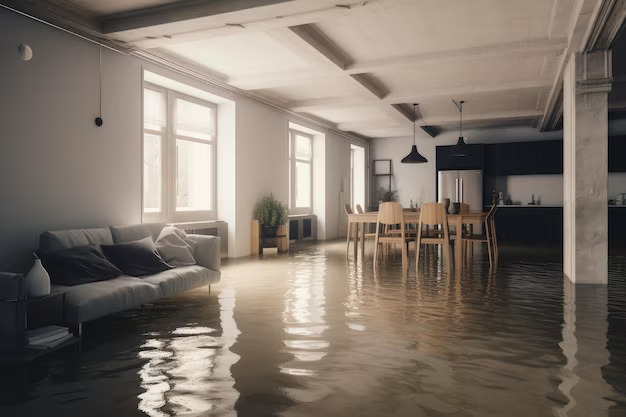Flooding can be more than just a natural disaster; it can significantly impact the value of your property. In this comprehensive guide, we explore the various aspects of how flooding affects house values and provide valuable insights to help homeowners navigate these challenges successfully.
Understanding the Basics
The Ripple Effect on Property Value
Flooding isn’t merely about water damage; its repercussions extend beyond structural harm. The ripple effect on property values is profound, with potential long-term consequences. From compromised foundations to the psychological impact on potential buyers, understanding these intricacies is vital.
Localized Impact on House Prices
The geographical location of a property plays a pivotal role in determining how much flooding can devalue a house. Coastal areas or regions prone to heavy rainfall may experience more substantial decreases in property value compared to arid zones. Understanding these localized impacts is crucial for homeowners and potential buyers alike.
The Role of Insurance in Property Value
Insurance isn’t just a safety net; it’s a lifeline when it comes to minimizing the impact of flooding on property value. Homes with comprehensive flood insurance often fare better in terms of devaluation compared to those without, emphasizing the importance of proactive risk management.
Quantifying the Impact
Assessing Property Damage
To comprehend how flooding affects property values, one must first evaluate the extent of damage. From structural impairments to compromised electrical systems, a thorough assessment is crucial. This understanding forms the basis for calculating the subsequent decrease in property value.
Comparative Market Analysis (CMA)
A Comparative Market Analysis (CMA) is a powerful tool for assessing how flooding stacks up against market trends. By comparing similar properties affected by flooding with those unaffected, homeowners gain valuable insights into the specific impact on their property’s value.

Financial Implications for Homeowners
The financial implications of flooding extend beyond immediate property devaluation. From potential difficulty in securing loans to increased insurance premiums, understanding these consequences empowers homeowners to make informed decisions in the aftermath of flooding.
How Much Does Flooding Devalue a House
The Varying Degrees of Devaluation
Not all floods are created equal, and their impact on property values varies accordingly. From minor incidents causing temporary decreases to severe, recurrent flooding leading to substantial long-term devaluation, understanding these degrees is crucial for homeowners seeking to protect their investments.
Property Resilience and Its Impact
Understand how resilient features in a property can mitigate devaluation, providing insights into smart investments for homeowners.
Investing in resilient features, such as flood-resistant materials and elevated foundations, can significantly impact a property’s resilience to flooding. Uncover the measures homeowners can take to enhance their property’s ability to withstand floods and minimize devaluation.
Community Measures and Their Influence
Communities that implement effective flood prevention measures can positively influence property values. From robust drainage systems to communal flood defenses, understanding these collective efforts provides homeowners with valuable insights into the overall resilience of their neighborhood against flooding.
Frequently Asked Questions
How quickly does flooding devalue a house?
The speed at which flooding devalues a house varies, depending on factors such as flood severity and property resilience. In some cases, immediate devaluation may occur, while in others, the impact may be gradual. Homeowners should take swift action to mitigate further losses.
Can property improvements counteract devaluation?
While flooding can lead to property devaluation, strategic improvements can help counteract these effects. From structural enhancements to landscaping measures, homeowners have the power to positively influence their property’s value in the face of flooding challenges.
What role do real estate trends play in devaluation?
Real estate trends can either amplify or mitigate the impact of flooding on property values. A seller’s market may cushion the blow, whereas a buyer’s market could exacerbate devaluation. Staying informed about broader trends is essential for homeowners navigating the aftermath of flooding.
Are there insurance options that protect against devaluation?
Certain insurance options go beyond standard coverage to specifically address devaluation due to flooding. Exploring these specialized policies can provide homeowners with added peace of mind and financial protection in the event of property devaluation.
How can homeowners assess flood risk before purchasing?
Homeowners can assess flood risk before purchasing by taking the following steps:
- Check FEMA Flood Maps: Consult the Federal Emergency Management Agency (FEMA) flood maps to understand the flood risk level in the specific area you’re considering for a home purchase.
- Elevation of the Property: Inquire about the elevation of the property in relation to base flood levels. Higher elevations generally have lower flood risks.
- Talk to Neighbors: Engage with potential neighbors to gather insights into the history of flooding in the area. Local experiences can provide valuable information.
- Insurance Quotes: Request flood insurance quotes for the property. This can give you an idea of the insurance cost, which may be higher in high-risk flood zones.
- Local Weather Patterns: Research local weather patterns and historical flood data for the region. Understanding the climate can help assess the likelihood of flooding.
- Home Inspection: Include a thorough home inspection as part of the purchasing process. Inspectors can identify signs of previous flooding and assess the property’s vulnerability.
- Building Codes and Regulations: Investigate local building codes and regulations related to flood prevention and mitigation. Compliance with these codes can indicate a property’s resilience against flooding.
- Topography of the Area: Examine the topography of the land. Properties situated on higher ground or with effective drainage systems may be less prone to flooding.
- Consult Real Estate Professionals: Seek guidance from local real estate professionals who have insights into flood risks in specific neighborhoods. They can provide valuable advice based on their experience.
- Ask Previous Owners: If possible, talk to previous owners about their experiences with flooding or any measures they took to address flood risks.
Is flooding a common issue in Pembroke Pines?
Flooding is not an uncommon issue in Pembroke Pines. Situated in South Florida, the city’s geographic location makes it susceptible to heavy rainfall, tropical storms, and hurricanes, which can lead to flooding events. The flat topography and proximity to water bodies contribute to the susceptibility of certain areas within Pembroke Pines to flooding.
While the frequency of flooding can vary, residents should be aware that Pembroke Pines, like many regions in Florida, experiences its fair share of weather-related challenges. It is advisable for homeowners to stay informed about local weather patterns, take proactive measures to protect their properties, and be prepared for potential flooding events.
Understanding the commonality of flooding in Pembroke Pines is essential for residents to make informed decisions regarding property maintenance, insurance coverage, and emergency preparedness. Additionally, staying connected to local authorities and being aware of community initiatives aimed at flood prevention can contribute to a more resilient and prepared community in the face of such challenges.
How does PuroClean of Pembroke Pines contribute to property restoration?
PuroClean of Pembroke Pines plays a pivotal role in property restoration, particularly in the aftermath of flooding. The company specializes in providing efficient and effective restoration services to homeowners and businesses in Pembroke Pines, offering a range of solutions to mitigate the damages caused by water-related incidents.
Here’s how PuroClean of Pembroke Pines contributes to property restoration:
- Rapid Response: PuroClean understands the urgency of addressing water damage promptly. The company prides itself on its swift response time, ensuring that trained professionals are on-site quickly to assess the situation.
- Water Extraction and Drying: The team at PuroClean is equipped with advanced water extraction and drying equipment. They efficiently remove standing water from the affected area and implement drying techniques to prevent further damage and mold growth.
- Mold Remediation: One of the potential consequences of water damage is mold growth. PuroClean of Pembroke Pines offers mold remediation services, addressing any mold issues that may arise as a result of flooding.
- Property Reconstruction: In cases where structural damage occurs, PuroClean provides reconstruction services to restore the property to its pre-damage condition. This includes repairs to walls, flooring, and other structural elements.
- Thorough Cleaning and Sanitization: PuroClean ensures a thorough cleaning and sanitization process to eliminate any contaminants that may have entered the property with floodwaters. This step is crucial for the safety and well-being of the property’s occupants.
- Coordination with Insurance Companies: PuroClean of Pembroke Pines assists homeowners in navigating the insurance claims process. Their expertise in dealing with insurance companies helps ensure a smoother and more efficient restoration experience for the property owner.
- Preventative Measures: Beyond restoration, PuroClean offers guidance on preventative measures to minimize the risk of future water damage. This may include recommendations for improvements in property infrastructure and proactive steps to reduce vulnerability to flooding.
Can homeowners insurance in Pembroke Pines cover devaluation from flooding?
No, standard homeowners insurance in Pembroke Pines usually doesn’t cover devaluation caused by flooding. Homeowners need a separate flood insurance policy for that, typically provided by the National Flood Insurance Program (NFIP) or private insurers. Standard insurance might cover certain water damage, but not widespread flooding. It’s crucial for Pembroke Pines residents to consider purchasing flood insurance to protect against property devaluation from flooding.
What steps can Pembroke Pines residents take to minimize flood risks?
To minimize flood risks in Pembroke Pines:
- Stay Informed: Keep an eye on weather forecasts and flood alerts.
- Elevate Structures: If possible, lift your home or key structures to avoid flood damage.
- Install Sump Pumps: Use sump pumps to remove excess water from basements.
- Proper Landscaping: Ensure proper slopes away from buildings to direct water away.
- Secure Documents: Keep important papers in a waterproof and elevated container.
- Flood Barriers: Use barriers or sandbags during flood threats to protect your property.
- Get Flood Insurance: Invest in flood insurance for added protection.
- Use Flood-Resistant Materials: Build or renovate with materials that resist flood damage.
- Emergency Plan: Create and practice a family emergency plan, including evacuation routes.
- Community Engagement: Join local initiatives for flood prevention and collaborate with neighbors.
- Check Drainage Systems: Regularly inspect and clear gutters and downspouts.
How quickly can PuroClean of Pembroke Pines respond to a flooding emergency?
PuroClean of Pembroke Pines is known for its swift response to flooding emergencies. Our team is equipped to respond promptly, understanding the urgency of the situation. Typically, We aim to be on-site quickly to assess the extent of the flooding and initiate the necessary restoration processes. The speed of our response is crucial in mitigating further damage and minimizing the impact of flooding on the property. Homeowners in Pembroke Pines can rely on PuroClean’s efficient and timely intervention in the face of a flooding emergency.
Conclusion
In conclusion, understanding the multifaceted impact of flooding on property values is crucial for homeowners. By implementing proactive measures, staying informed, and leveraging available resources, homeowners can mitigate the devaluation risks associated with flooding.




 PuroClean of Ft. Lauderdale South
PuroClean of Ft. Lauderdale South